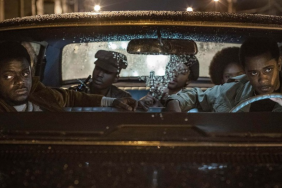The word “snub” is probably used more often in conjunction with the Academy Awards than any other subject. We hear about it all the time. “Star Wars got snubbed for Best Picture,” “Idris Elba got snubbed for Best Supporting Actor.” It implies that the Oscars have turned their back on quality work, and that the artists – or at least their fans – should be taking it as a personal affront.
But here’s the thing: winning an Academy Award would probably be nice (heaven knows I’d sure like one), but it’s not the end all, be all of filmmaking. I’ve said it before and I’ll say it again: time is the only critic who matters. Winning an Oscar puts you in the record books, and you’ll be there forever, but you can still win the hearts and minds of audiences in the long run with your artistic quality and cultural impact.
To put it another way… if everyone complains that a movie got “snubbed,” then it’s already won the popularity contest. And to quote Game of Thrones creator George R.R. Martin: “The reward for popularity is popularity!”
Also: LGBT at the Oscars | The Films The Academy Honored (and Snubbed)
This is not to say that Oscar snubs don’t matter, although they probably matter a lot less than we act like they do. The more recent Oscar snubs, like The Social Network losing to The King’s Speech, and Brokeback Mountain losing to Crash, can serve as useful reminders of how much we need to grow in our appreciation of art. Besides, time hasn’t had its final say about those movies yet. It’ll take a few more decades before we know for an absolute certainty that future generations won’t give a crap about Crash or The King’s Speech.
So here is our list of infamous “Oscar snubs” who, it turns out, didn’t even need the Oscar in the first place. Their place in history is safe and secure, so we can all finally just shut the hell up about it.
Citizen Kane

RKO Radio Pictures
Lost: Best Picture / Best Director (1942)
The so-called “greatest movie ever made” (and we’re not going to argue) is also one of the most infamous snubs in Oscar history. Orson Welles’ groundbreaking drama about a publishing mogul who buys the world but loses everything fought negative publicity before, during and after its release from newspaper tycoon William Randolph Hearst, who (accurately) believed the film was a thinly disguised dig at his own life and career.
The smear campaign severely hampered the film’s popularity, but even so, it was still nominated for nine Academy Awards. (It even won one of them: for Welles and his co-writer, Herman J. Mankiewicz, for Best Original Screenplay.) In any case, for decades now, film lovers have often complained because Citizen Kane lost Best Picture and Best Director to John Ford’s How Green Was My Valley, a fine film but one that no longer has nearly as much cultural value as Orson Welles’ masterpiece.
And yet the fact that fans still complain is proof positive that the film’s position in history is officially secure. Citizen Kane may have “deserved” the Best Picture win, but it didn’t need it. It’s still the best.
Goodfellas

Warner Bros.
Lost: Best Picture / Best Director (1991)
For a long, long time Martin Scorsese was one of the most routinely snubbed filmmakers in Hollywood, and people still complain that films like Taxi Driver and Raging Bull should have won Best Picture in their respective years. (He eventually won an Oscar over in 2007, for The Departed.) But Goodfellas is another story, because Goodfellas didn’t just lose, it lost to Dances With Wolves, a film nobody seems to give care about anymore.
In contrast, the sprawling mafia drama Goodfellas is (arguably) the best film by (arguably) America’s best living director, and is now considered to be one of the undisputed masterpieces of the 1990s. And somehow it lost both Best Picture and Best Director to an overlong vanity piece directed by Kevin Costner.
Or at least, that’s what most people say. And again, that’s why it doesn’t really need that Oscar after all. Goodfellas will be taught in film schools for generations to come. Nobody talks about Dances With Wolves anymore unless they’re complaining that it beat Goodfellas. Check and mate, Costner.
Cary Grant

MGM
Lost: Best Actor, twice (1942 and 1945)
Lots of big movie stars are overlooked by the Academy, because lots of big movie stars fill their careers with crowd pleasing roles that don’t seem “important” enough to be nominated. Perhaps that’s why it’s such a big deal that Sylvester Stallone is nominated for Best Supporting Actor for Creed, because after years of Expendableses and Stops! Or My Moms Will Shoots, the Academy is finally willing to admit that he exists again.
And yet the greatest movie stars don’t really need Oscars because, again, they’re movie stars. They are beloved and familiar, and their talent has earned them legions of fans. Cary Grant is a perfect example of this. He never won an Oscar (even though he was nominated twice), but he was still one of the slickest and most sophisticated actors in Hollywood for decades.
Maybe he made too many comedies for the Academy to take him seriously. Maybe. Who knows? Cary Grant remains one of the most famous film stars in history. People know his name even if they haven’t seen his movies, and that name is synonymous with high class. Cary Grant won our hearts, and hey, he even won an Honorary Academy Award in 1970, so it’s time to stop complaining. No one can argue that Cary Grant didn’t do rather well for himself.
High Noon

United Artists
Lost: Best Picture / Best Director (1953)
High Noon is one of the best and most famous western movies, about a lawman whose town is filled with cowards who know the right thing to do, but instead choose to do the other thing out of self-preservation. It’s a compelling motion picture, and it won four Academy Awards, for Best Actor (Gary Cooper), Best Film Editing, Best Original Song and Best Score. It was a very respectable showing at the Oscars.
But we’re still complaining that High Noon didn’t win Best Picture to this day, and this time it’s not because High Noon was necessarily the best film of the year. It’s mostly because the actual winner was The Greatest Show on Earth, which is widely considered to be the worst film that ever took home the top Academy Award. Cecil B. DeMille’s overwrought, big top melodrama would probably be completely forgotten by the masses today had it not won Best Picture, but hey… everyone still remembers High Noon, so let’s all just calm the hell down about it. Don’t pretend you’ve never made a mistake before in your life.
Alfred Hitchcock

NBCUniversal Television
Lost: Best Director, five times (1941, 1945, 1946, 1955 and 1961)
Alfred Hitchcock directed a film that won Best Picture (Rebecca), but he never won a competitive Oscar for Best Director. This after being nominated five times throughout his career, for films like Spellbound, Rear Window and Psycho. And this strange fact still pisses people off, because Hitchcock is one of the greatest and most influential filmmakers in history.
He may not have invented suspense, but when it comes to the movies, he was the director who perfected it. His innovative techniques are still being used today, often by filmmakers who don’t even know who they’re ripping off because of all the imitators who came in Alfred Hitchcock’s wake. It’s hard to feel bad for an artist whose style was so distinctive that his last name is now an adjective (“Hitchcockian,” what a great word).
Besides, the Academy gave Alfred Hitchcock an honorary Oscar in 1968, so you can’t say that they completely ignored him. You can just say that sometimes they screwed up. A lot, in fact.
Stanley Kubrick

MGM
Lost: Best Director, four times (1965, 1969, 1972 and 1976)
Stanley Kubrick – the director of 2001: A Space Odyssey, Dr. Strangelove, Full Metal Jacket, A Clockwork Orange and The Shining – never won an Academy Award.
That sentence you just read, the one before this one, was actually lie. People often forget (or don’t bother to look up) the fact that Stanley Kubrick actually did win an Academy Award in 1969. He just didn’t win it for “Best Director,” the award that he probably deserved the most. Kubrick was part of the team that won the Best Visual Effects Oscar for 2001, so no, the Academy didn’t snub him altogether. They just snubbed him repeatedly in all of the categories that arguably mattered the most.
And yet, Stanley Kubrick continues to blow new minds every single day. His challenging, virtuosic films still stand out as many of the best motion pictures ever produced. He is a legend in the field of filmmaking. It would have been nice if he’d won a Best Director Oscar, but as far as his fans are concerned, he already won. At life.
The 1940 Best Picture Nominees

MGM
Lost To: Gone With the Wind
Nowadays, the Civil War epic Gone with the Wind is considered to be an impressive production but a socially backward motion picture, and we’re not even going to argue that. But at that time it was a juggernaut on the scale of Titanic and nothing was going to stop it, even the other Best Picture nominees, which that year included some of the best films ever made, like The Wizard of Oz, Mr. Smith Goes to Washington, Stagecoach, Ninotchka, Dark Victory and more.
A lot of people still complain about Gone with the Wind, for a variety of reasons, and a lot of people wish that another film had won Best Picture in Gone with the Wind‘s place. But look, sometimes it’s just an incredibly competitive year. Let’s see two more examples, starting with…
The 1977 Best Picture Nominees

MGM
Lost To: Rocky
Look, everyone loves Rocky. It’s an incredibly well-produced underdog drama that set the template for practically every underdog drama that came after it. In almost any other year, it could have won Best Picture and nobody would have complained. But in 1977 it was competing with powerful, unsettling movies like All the President’s Men, Network and Taxi Driver (and also Bound for Glory, which is good but not exactly on the same level as all of those other films).
If you have to compare an inspirational movie like Rocky and cynical films like All the President’s Men, Network and Taxi Driver, you’re bound to find out a little something about yourself. Certain kinds of movie lovers are simply going to prefer a damning social commentary like Network over Rocky, but you know what? That doesn’t mean there’s anything wrong with Rocky. Sometimes a bad film wins Best Picture instead of a great film, but in 1977 it was just a matter of preference. And Rocky won out, fair and square.
Besides, we’re still talking about All the President’s Men, Network and Taxi Driver to this very day (not so much Bound for Glory). So they’re all winners, just like…
The 1995 Best Picture Nominees

Columbia Pictures
Lost To: Forrest Gump
1995 was another one of the toughest years in the Best Picture race, because there were three contenders for the big prize that are still culturally significant today: Forrest Gump (which won), Pulp Fiction (which changed the language of movies), and The Shawshank Redemption (which still makes grown men cry).
At that time, Forrest Gump was the clear cut winner: it was a blockbuster “American” epic with groundbreaking visual effects. But nowadays the tide has turned against it. Some even think that it’s already as backward as Gone with the Wind. Meanwhile, Pulp Fiction and The Shawshank Redemption hold up just about as well as ever, and still earn new fans with every passing generation.
If Forrest Gump survives another 100 years of public opinion, it probably will survive with caveats and apologies. But Pulp Fiction and The Shawshank Redemption seem destined to live on, and on their own merits. (And incidentally, the other nominees – Four Weddings and a Funeral and Quiz Show – were both pretty good too.)
Star Wars

LucasFilm
Lost To: Annie Hall
First of all, Annie Hall is a great movie. If you don’t believe me, there is an excellent chance you either haven’t seen Annie Hall or that you saw it when you were too young to understand the film’s complex romantic relationships through the filter of your personal experience.
But beyond that, and even if you disagree about Annie Hall, Star Wars is the absolute epitome of the George R.R. Martin’s line, “The reward for popularity is popularity.” Star Wars broke box office records and became one of the most dominant cultural influences on the entire planet. It won a bunch of Oscars too, but it just didn’t win Best Picture. Boo-fucking-hoo.
Look, if you make billions of dollars because everyone loves a wacko story that you invented about aliens and laser swords, you don’t also need a gold statue. Everyone loves Star Wars. Don’t be petty and begrudge Annie Hall a little recognition for just happening to be brilliant in the same year your personal favorite movie came out.
Star Wars wins. Star Wars wins everything. Even if it loses, it wins. You don’t need the Oscars to validate Star Wars. Your love of Star Wars validates Star Wars. Your love of anything pretty much validates that thing. So stop complaining about Oscar snubs and just love the things you love. And find new things to love. And make some lovable things of your own.
Top Photo: Warner Bros.
William Bibbiani (everyone calls him ‘Bibbs’) is Crave’s film content editor and critic. You can hear him every week on The B-Movies Podcast and watch him on the weekly YouTube series Most Craved and What the Flick. Follow his rantings on Twitter at @WilliamBibbiani.
Slideshow: 13 People You Forgot Won Oscars
13 People You Forgot Were Oscar-Winners
-
Fisher Stevens

Fisher Stevens is best known for his roles in films like Short Circuit and Hackers. Although never nominated for his acting, Stevens was one of the producers of the 2009 documentary feature The Cove, which earned him his Oscar.
Photo: United Artists
-
Peter Capaldi

Actor Peter Capaldi is currently gathering attention for his depiction of The Doctor on the long-running Doctor Who TV series. Previously, he had a long career of comedic acting, and, in 1993, wrote and directed a short film called Franz Kafka's It's a Wonderful Life. He won an Oscar for it.
Photo: BBC
-
Steven Wright

Steven Wright is one of the more popular comedians to have risen to fame during the comedy boom of the 1980s. He didn't act in many films, but in 1988, he produced, co-wrote and starred in an Oscar-winning live-action short called The Appointments of Dennis Jennings. Rowan Atkinson played the shrink.
Photo: MGM
-
Stanley Kubrick

It's an infamous piece of film trivia that Kubrick, a master of cinema, never won an Oscar for Best Director. He did, however, win an Oscar for being part of the special effects team on 2001: A Space Odyssey. Many forget this.
Photo: MGM
-
George Pal

George Pal was a master of sci-fi matinee fare throughout the 1950s and 1960s, producing films like The War of the Worlds, The Time Machine, and When Worlds Collide. He, like Kubrick, was awarded for being part of a film's special effects team. The winning film was 1950's Destination Moon.
Photo: Eagle-Lion Classics Inc.
-
Aaron Copland

Arguably one of the greatest of all American composers, Aaron Copland is best known in the music world for ballets like Rodeo and dozens of others. He also dabbled in film music from time to time, and one of those dabblings earned him an Oscar. Although few still talk about William Wyler's 1949 film The Heiress.
Photo: Paramount
-
George Miller

Director George Miller is currently up for Best Director and Best Picture for Mad Max: Fury Road. While the film's many fans are rooting for a win, we must recall that Miller already won an Academy Award for the 2006 animated film Happy Feet.
Photo: Warner Bros.
-
Hal Needham

Hal Needham is a director best known for his fun, lowbrow chase films like Smokey and the Bandit, The Cannonball Run, and Rad. In 1986, Needham was awarded a scientific and technical Oscar for co-inventing a camera rig called the Shotmaker Elite.
Photo: Universal
-
Ub Iwerks

Animation buffs know the name Ub Iwerks very well, as he is one of the star animators to have worked for Disney back in the early days. He is often credited for co-creating Mickey Mouse. Over the course of his career, Iwerks actually won two scientific and technical Oscars for inventing a new optical printer used for special effects matte shots (in 1959), and for co-pioneering Color Traveling Matte Composite Cinematography (in 1964).
Photo: Disney
-
The Beatles

Yes, all the songs in the 1970 The-Beatles-Are-Most-Certainly-Breaking-Up music film Let It Be appeared in the film before they appeared on a record. As such, The Beatles have won Oscars for them.
Photo: United Artists
-
John Irving

The famed American novelist John Irving has written notable and odd standards like The World According to Garp, A Son of the Circus, and A Widow for One Year. In 1999, his novel The Cider House Rules was adapted to film, and he wrote the screenplay himself. The film was Oscar bait for sure, and Irving walked away with one.
Photo: Miramax
-
Saul Bass

Saul Bass is best known for his graphic design for posters and movie title sequences, among them The Shining, Vertigo, and Anatomy of a Murder. In 1968, Bass also directed a documentary short about the creative process called Why Man Creates, which won an Oscar. It's a sight better than his sci-fi film Phase IV.
Photo: Pyramid Films
-
Irwin Allen

TV fans know Irwin Allen for his work on Lost in Space. '70s disaster junkies know him for his work on The Poseidon Adventure and The Towering Inferno. The Academy, however, knew him for his 1953 documentary feature The Sea Around Us, based on the book by Rachel Carson.
Photo: RKO








